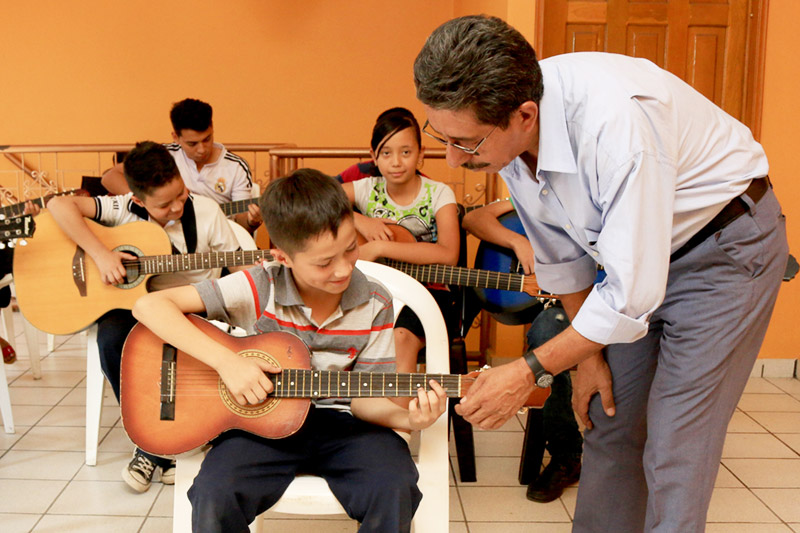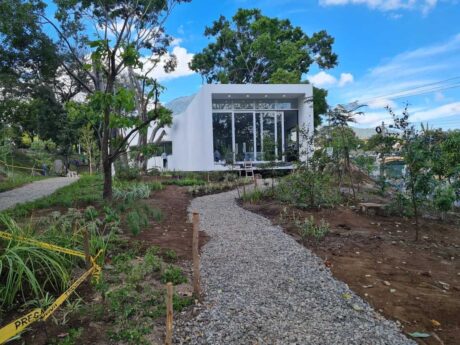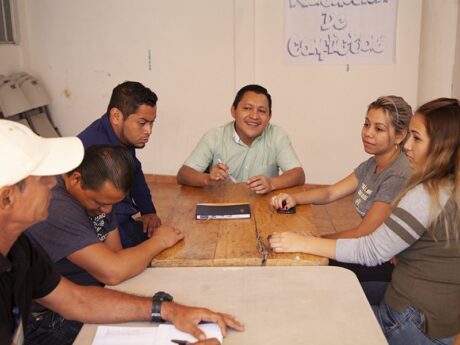En comunidades de todo El Salvador, La música está ayudando a cientos de jóvenes en riesgo a mantenerse alejados de una vida de pandillas y crimen.. Las orquestas filarmónicas juveniles son parte del enfoque holístico del Proyecto de Prevención del Crimen y la Violencia de El Salvador para prevenir el crimen y la violencia y difundir oportunidades..
En uno de los países más violentos del mundo., Los sonidos de la música están ayudando a los jóvenes en riesgo a mantenerse alejados de una vida de pandillas y crimen..
En Ilobasco, El Salvador, más que 100 edades juveniles 8 a 29 quienes viven en algunos de los vecindarios más difíciles están eligiendo instrumentos musicales en lugar de afiliaciones a pandillas.
Jhonnatan Marroquín, de once años, podría haber sido una estadística de criminalidad en Ilobasco. En cambio, el es guitarrista.
“Desde que cogí la guitarra, he estado muy ocupado,“dice Jhonnatan. “Es divertido y no me meto en nada malo, como pandillas”.
Ilobasco y otras ocho comunidades en El Salvador están organizando y administrando orquestas filarmónicas locales para involucrar a jóvenes en riesgo y vulnerables en iniciativas positivas., actividades de futuro.
El Proyecto de Prevención del Crimen y la Violencia en El Salvador—un programa innovador financiado por el A NOSOTROS. Agencia para el Desarrollo Internacional e implementado por Creative Associates International, está trabajando en Ilobasco y otras comunidades para idear formas de llevar una paz duradera a los barrios problemáticos..
El proyecto ha formado comités municipales que coordinan iniciativas de seguridad y prevención del delito y ha ayudado a desarrollar actividades comunitarias que involucran a jóvenes en riesgo para mantenerse alejados del crimen y las pandillas.. Utilizando una variedad de iniciativas, desde el arte, música, y clubes de baile hasta actividades al aire libre: el proyecto ya ha ayudado 53,000 la juventud salvadoreña en 55 municipios.
ilobasco, un pueblo de algunos 65,000 residentes ubicados aproximadamente 30 millas al noreste de la ciudad capital de San Salvador, tenía 91 homicidios reportados en 2014 y 88 asesinatos en 2015, muy por encima de lo que los expertos describen como tasas epidémicas.
Manuel Antonio Henrqiuez, Coordinadora del Comité Municipal de Prevención de la Violencia en Ilobasco, es honesto sobre los desafíos que enfrenta su municipio.
“Estamos entre los 50 municipios más violentos de nuestro país,", se lamenta.
Pero él no se da por vencido con su ciudad., y espera que la música sea una de las formas de llegar a la raíz del problema.
Una oportunidad justa de jugar

El programa en el que participa Jhonnatan consiste en una escuela de orquesta juvenil, una especie de filarmónica municipal. El Proyecto de Prevención del Crimen y la Violencia en El Salvador de USAID financia nueve escuelas filarmónicas que están llegando a más de 600 jóvenes en riesgo sin costo para ellos o sus familias.
Mario Ernesto Acosta Romualdo, un psicólogo que solía coordinar la herramienta de prevención filarmónica para el Proyecto de Prevención del Crimen y la Violencia de El Salvador, dice que se utiliza una metodología múltiple para determinar dónde este tipo de intervención podría inclinar la balanza a favor de la paz..
“Seleccionamos las comunidades donde creemos que tendríamos el mayor impacto, observando varios factores de riesgo, incluyendo actividad de pandillas, familias disfuncionales y violencia doméstica, drogas, alcohol, entre otros,” dice Acosta Romualdo, quien desde entonces abandonó el proyecto.
Pobreza, migración a otros países, Los hogares monoparentales y otros factores significan que la mayoría de los jóvenes en las áreas objetivo no tienen formación formal en música., y mucho menos el acceso a instrumentos musicales.
Afortunadamente, el programa financiado por USAID proporciona el plan de estudios, equipamiento y estipendios para profesores. La comunidad aporta espacio para las sesiones de práctica y para guardar el equipo., mientras que la Secretaría de Promoción Cultural colabora en la capacitación de los instructores.
Los jóvenes son evaluados para medir su potencial y aptitud, aunque nadie es rechazado del programa. Después de unos ocho meses de práctica constante y refuerzo positivo, están listos para actuar en público.
Empoderamiento juvenil más allá de la música
Tito Antonio Álvarez trabaja en la Alcaldía de Ilobasco y es coordinador de la orquesta filarmónica del pueblo.
“Este es un gran proyecto,” dice Álvarez. “Está ayudando a los jóvenes, especialmente para superar todos los problemas sociales que estamos viviendo aquí en El Salvador.. Antes de que comenzara este programa, los jóvenes aquí en Ilobasco pasaban su tiempo con amigos o en casa, o simplemente caminar por la ciudad. Ahora dedican su tiempo a la música”.
Mientras se mantiene a los jóvenes en riesgo involucrados en actividades positivas, Las orquestas filarmónicas desempeñan un papel más allá de mantener ocupados a los jóvenes en riesgo.. El psicólogo Acosta Romualdo dice que los jóvenes objetivo sufren de baja autoestima y otras condiciones que pueden abordarse a través del programa..
“Es importante reforzar este equilibrio y desarrollar la autoestima para que puedan ver sus deficiencias., medio- y potencial a largo plazo," él dice.
Este enfoque surge de la estrategia del Proyecto de Prevención del Crimen y la Violencia de El Salvador de alentar a los jóvenes en riesgo a ver un futuro más allá del presente..
Acosta Romualdo señala que los efectos del programa van más allá de los propios jóvenes músicos.
“Hemos notado que cuando un instrumento ingresa a una casa, impacta a todos, no solo el joven. Toda la familia se interesa.; ellos ven el aprendizaje que continúa. Ellos ven la dedicación, y comienzan a vivir ese tipo de valores de trabajar juntos y ayudar,añade Acosta Romualdo.
Eliseo Castellanos canta las alabanzas del programa de la orquesta filarmónica.
Se encuentra en su sexto mandato como alcalde de Ilobasco., que tiene más de 100 jóvenes participantes en su orquesta filarmónica.
"Es algo realmente agradable. Vemos mucho entusiasmo,” dice el alcalde Castellanos. “Tenemos cinco profesores de música que enseñan a los niños, y creemos que esto definitivamente está ayudando con [crimen y violencia juvenil] prevención. La comunidad está muy entusiasmada y eso me hace muy feliz”.
El alcalde de Ilobasco añade: “Hablo con los jóvenes y con los adultos. Todos estan motivados. Esto realmente está funcionando. Realmente necesitamos esto”.
Construyendo orgullo familiar y comunitario
La madre de Jhonnatan es una entusiasta defensora de la orquesta filarmónica. En el caso de Jhonnatan, aprender a tocar la guitarra ha sido especialmente útil porque nació con una afección de la columna que lo mantiene en silla de ruedas..
“Él ha sido un poco tímido y solía preguntarme por qué estaba en silla de ruedas.. Ha sido difícil porque nuestra parte de la ciudad es rural y es difícil transitar en silla de ruedas porque hay muchas piedras en el camino.,” says Julia Irma Marroquín. “Me decía que no quería ir a la escuela porque se caería de la silla.. Pero desde que empezó en la escuela de orquesta, él dice que quiere ir. el quiere aprender. Quiere cantarme canciones”.
El psicólogo Acosta Romualdo conoce la situación de Jhonnatan en Ilobasco.
“Él y su madre me decían que muchas veces lo habían excluido por su condición física.,” dice Acosta Romualdo. “Pero ahora, a pesar de que las clases están en un segundo piso sin fácil acceso para él, los niños y el instructor lo levantan para la clase y lo bajan después, y ahora siente que es parte de algo. Eso es muy satisfactorio”.
Desarrollar la autoestima de Jhonnatan y permitirle ver un futuro son algunos de los resultados positivos del programa..
“Sus logros son una victoria para mí como su madre.," ella dice. “La guitarra literalmente cambió su vida.. Estoy muy agradecida por el proyecto y agradecida de que le haya traído tanta felicidad a mi hijo”.
Jhonnatan ha sabido encontrar la pasión por la música y ya piensa en su futuro.
“Estoy sacando muy buenas notas, y algun dia quiero ser director de una gran empresa, una de esas empresas que fabrican computadoras, Televisores y cámaras de televisión”.
Armando José Guevara Guerra, de diez años, también está en la escuela filarmónica y no puede dejar de hablar efusivamente al respecto..
“Mi tía se lo contó a mi madre y vinimos, y realmente me gustó," él dice. “Estoy aprendiendo a tocar la guitarra., para tocar canciones. Mi nueva canción favorita se llama Tema de Amor (Tema de amor)."
Armando está tan entusiasmado con participar en el proyecto que también toca música en la iglesia y dice que quiere ser profesor de música cuando sea grande..
“Quiero ser profesor aquí mismo (en la escuela filarmónica). En la iglesia toco la canción 'Cantando la alegría de vivir',- dice Armando.
Aunque el objetivo del programa no es formar músicos profesionales., Álvarez, de la Oficina del Alcalde, dice que un puñado se ha ganado la vida como artistas profesionales..
Álvarez dice que las orquestas filarmónicas transforman la forma en que las comunidades se ven a sí mismas.
“En este país, tener una filarmónica local es algo completamente nuevo. Verías eso en Europa, en otros lugares, pero no aquí,dice Álvarez. “Pero ahora, lo que hemos logrado en tan poco tiempo, Bueno, eso me hace muy feliz. El Salvador no es sólo violencia. hay cosas buenas, y cosas positivas”.
Reportado desde El Salvador por Michael J.. Zamba y René Urrutia.



